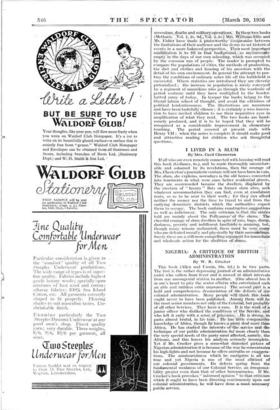NIGERIA: A CRITIQUE OF BRITISH ADMINISTRATION By W. R. Crocker
This book (Allen and ljnwin,. 10s. 6d.) is in two parts. The first is the rather depressing .jorirnarof an administrative cadet who suffers from-fever and.iamoved at sh-ort intervals from one uncongenial station to. another. (One almost has it in one's heart to pity the senior officers who entertained such an able and ruthless critic unawares-.) :Me, second. part is ,a bold and comprehensive denuneiation Of ;the- defects: of cur 'colonial administration. Many people' wiUtthink ,this.bonk ought never to have been putdished- Arriattg them will ifae the most senior members not only of the Colonial, but probably of all other Services. They 'have a case. • It.Js the work.ot.a junior officer who disliked the conditions of the-Service, acid who left it early with a sense of 'grievance,. 7,fle is strong, in parts almost brutal, in his torie.':. he cOmparat knowledge of Africa, though 11.0. knows a gteht deal more than Africa. He has studied the interests, of-tile:iv-vice gild-the technique of our public administration -fat more closely-than the very special needs of the partylnostirffeeted,:natittly, the Africans, and this leaves his analysis seriously incomplete. Yet if Mr. Crocker gives a somewhat distorted: picture of Nigerian administration it is because of the way he concentrates his high-lights and not because he offers untruths or exaggera- tions. The amateurishness which he castigates is, all too true and yet Nigeria is one of 'the most effi8ient- of our _colonial governments. Its defects spring from the fundamental weakness of our Colonial Service, an irresponsi- bility.- greater even than that of :other bureaucracies. If Mr. Crocker's book provokes " informed opinion " to that criticism which. it ought to have been directing continuously upon our colonial administration, -he will 'have done a= most necessary public service.


































































 Previous page
Previous page